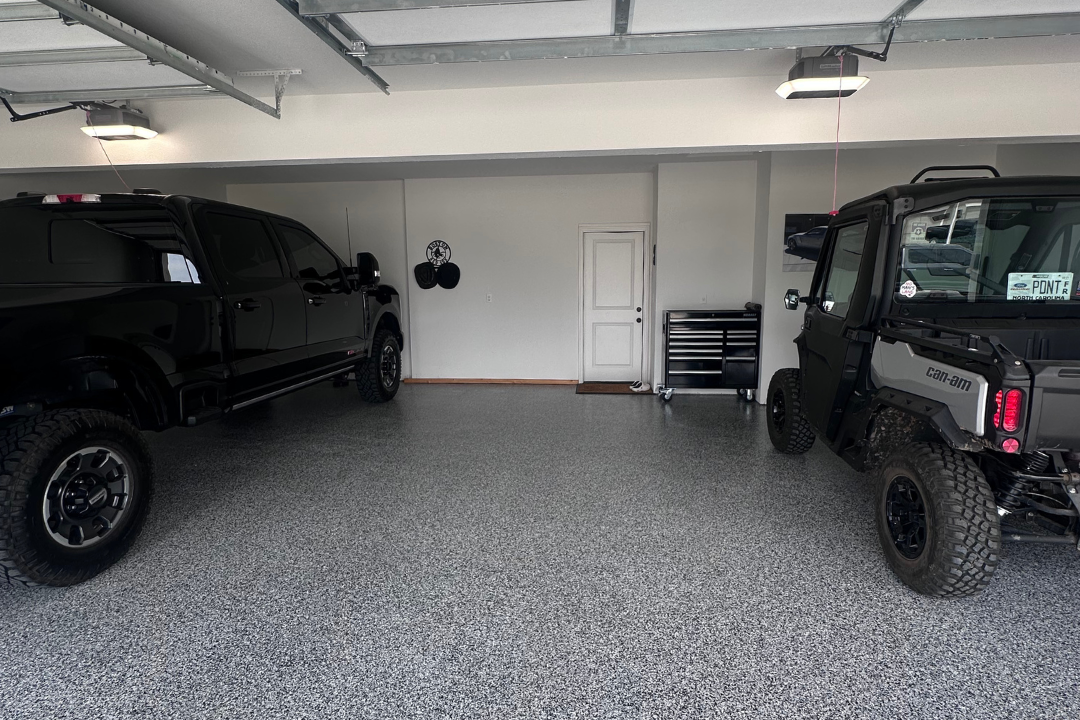
Winter-Proof Your Concrete: What to Do Before the First Freeze
In Kansas, winter weather is anything but mild. One week you’re enjoying cool fall evenings—then overnight, the temperature plummets and your concrete is suddenly covered in snow and ice. While that shift may be expected, the long-term effects it has on your concrete are often overlooked.
If you own a home with a garage, driveway, patio, or basement slab, now is the time to think about freeze-thaw concrete protection. Because once that first freeze hits, it’s too late to reverse the damage—it’s already happening beneath the surface.
Let’s look at why freeze-thaw cycles are so hard on concrete, how to protect your surfaces before winter sets in, and why polyurea coatings are the best defense for Kansas homes.
What Is Freeze-Thaw Damage (and Why It Happens in Kansas)
Concrete may look solid, but it’s actually full of tiny pores. When water seeps into those pores and freezes, it expands. That expansion puts pressure on the concrete from the inside out, causing surface cracks, spalling, and even structural damage over time.
In Kansas, where temps fluctuate wildly in late fall and early spring, these cycles happen frequently—sometimes even daily. Each one weakens your concrete just a little more, until the damage becomes too big to ignore.
According to Concrete Network, freeze-thaw deterioration is one of the most common causes of long-term concrete failure in cold climates.
Signs Your Concrete Is at Risk
Before the first freeze, check for these warning signs:
- Surface cracks (even small ones can grow fast in winter)
- Pitting or flaking (a sign of previous freeze-thaw damage)
- Unsealed concrete (bare, porous, and vulnerable)
- Pooling water after rain or snowmelt
These issues don’t just look bad—they create safety risks, drive up repair costs, and can even impact your home’s resale value if left unaddressed.
How Polyurea Stops Freeze-Thaw Damage Cold
At Peak Concrete Coatings, we specialize in polyurea-based systems for a reason: nothing else holds up to Kansas weather like this.
Here’s how polyurea delivers superior freeze-thaw concrete protection:
- Chemical Bonding: It fuses directly with the concrete surface, creating a seamless, watertight barrier.
- Extreme Flexibility: Unlike brittle epoxy, polyurea flexes with temperature shifts—so it won’t crack when your slab expands or contracts.
- Fast Cure Time: Installed in a day, and fully cured in hours—even in cool weather.
- Salt & Chemical Resistance: Snowmelt and road salts won’t degrade the surface.
- UV Stability: Great for exposed driveways and patios, preventing yellowing and fading.
Learn more about how polyurea compares to epoxy for winter protection.
Where to Focus Before Winter Hits
While every slab of concrete can benefit from winterproofing, some areas need extra attention:
1. Driveways
Constant exposure to freeze-thaw cycles, road salt, and vehicle traffic makes your driveway a prime candidate for damage. A polyurea coating protects the surface while enhancing curb appeal.
See how we install polyurea coatings on Kansas driveways.
2. Garage Floors
Garage doors let in snow, water, and salt. Without a sealed surface, that moisture sinks into the slab and accelerates cracking. Polyurea keeps your garage clean, dry, and damage-free year-round.
3. Patios & Sidewalks
Outdoor surfaces are especially vulnerable to winter weather. A coating adds slip resistance while sealing out moisture and preventing surface breakdown.
Explore our patio coatings and outdoor finish options.
Timing Matters: Why Fall Is the Best Season to Coat Concrete
Once temperatures drop below freezing, coatings become harder to apply correctly. Polyurea is more flexible than most materials in cold conditions, but the optimal installation window is still early to mid-fall.
Getting your freeze-thaw concrete protection in place before the first frost ensures:
- Proper adhesion and cure time
- Minimal moisture in the concrete during prep
- A protected surface before snow, ice, and salt show up
Book your fall appointment now before slots fill up.
Don’t Let Winter Ruin Your Concrete
The freeze-thaw cycle is relentless—and your concrete won’t get through it unscathed unless it’s protected. By acting now, you can avoid costly repairs, stop new cracks from forming, and extend the life of your floors by decades.
At Peak Concrete Coatings, we make it easy. With one-day polyurea installation, long-term performance, and custom finishes, you’ll have both form and function locked in before the first snowflake hits.
Ready to winter-proof your surfaces? Schedule your free consultation today.
Author: Jake M.
